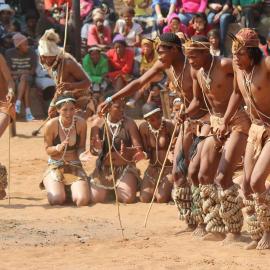Indigenous and traditional knowledge carries a vast amount of ecosystem and societal experience and best practices for a peaceful and ecologically sustainable way of life. We consider indigenous peoples as experts to be consulted as stakeholders and to actively contribute to research advancements with the adequate recognition, compensations, and rewards for their inputs while protecting indigenous knowledge from misappropriation and exploitation for commercial purposes.
"It is important to take into consideration in the discussions indigenous and traditional knowledge in its various forms."
— AfricArXiv @ #eLA19 (@AfricArxiv) October 25, 2019
Learn more at https://t.co/tJDCSvQtP5 and https://t.co/uuUbEhMfw2 pic.twitter.com/tbaar4w5kL

San Cultural Tourism in Southern Africa

Does cultural tourism always exploit those whose culture is on display? What happens when communities are in charge of their own cultural tourism ventures?
These questions propelled Rachel Giraudo’s survey of San-run cultural tourism projects in South Africa, Namibia, and Botswana, supported, in part, by an IPinCH fellowship.
Read the whole article at sfu.ca/ipinch/project-components/community-initiatives/san-cultural-tourism-southern-africa/
References
The Intellectual Property Issues in Cultural Heritage (IPinCH) project – sfu.ca/ipinch/
Indigenous Peoples of Africa Co-ordinating Committee (IPACC) – ipacc.org.za/
African Traditions Electronic Encyclopedia – traditions-afripedia.fandom.com/wiki/African_Traditions_Online_Encyclopedia_Wiki
Ibrahim HO (2019). ‘We Know How to Keep the Balance of Nature’. Why Including Indigenous People Is Vital to Solving Climate Change. Time.com